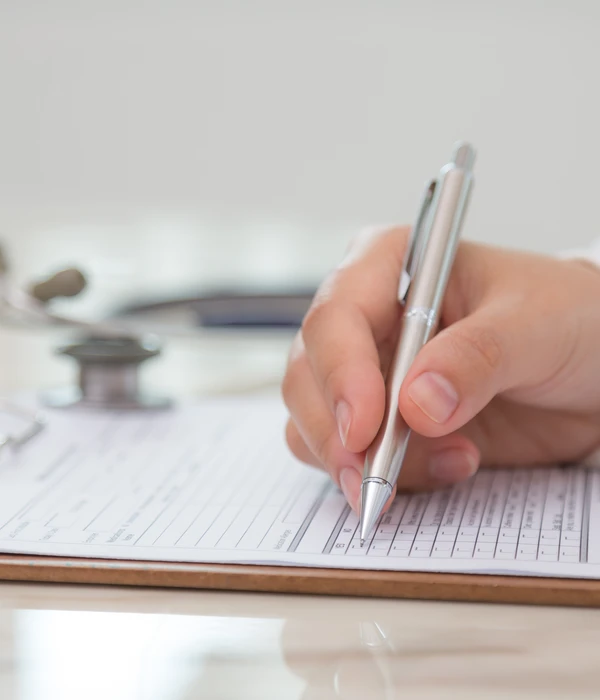Opioid Addiction Treatment
In 2019, opioids were responsible for 80% of the 600,000 drug-related deaths worldwide, with a significant portion due to overdose. Despite effective treatments like buprenorphine and naltrexone that reduce overdose risk, under 10% of those in need receive them.
Opioid addiction is a chronic disease that requires a comprehensive approach, including medication-assisted treatment and support services. Our treatment strategy addresses the complex nature of addiction, focusing on reducing cravings, managing withdrawal symptoms, and supporting long-term recovery for people with opioid use addiction.

What Are Opioids?
Opioids, also known as opioid medications or opioid pain relievers, are a class of drugs commonly used to treat moderate to severe pain. These substances work by binding to opioid receptors in the brain, reducing the perception of pain.
While opioids are effective medicines for pain management, their use is associated with addiction, making the treatment of opiate addiction an important part of healthcare. The risk of addiction, closely associated with opioid use, highlights the need for careful management and monitoring over time in treatment.
The use of opioid medications carries the potential for individuals struggling with addiction to develop a dependence, underscoring the importance of comprehensive treatment as well.

Symptoms of Opioid Dependence
Dependence on opioids can manifest through both physical and psychological symptoms:
- Increased tolerance to opioids
- Experiencing withdrawal symptoms when not using opioids
- Persistent desire or unsuccessful efforts to cut down or control opioid use
- Spending a lot of time obtaining, using, or recovering from the effects of opioids
- Cravings or a strong desire to use opioids
- Continued opioid use despite awareness of recurrent physical or psychological problems likely caused by opioids
- Failure to fulfill major role obligations at work, school, or home due to opioid use
- Giving up or reducing important social, occupational, or recreational activities because of opioid use
- Using opioids in physically hazardous situations
- Social or interpersonal problems caused or exacerbated by the effects of opioids
Our Opioid Addiction Treatment Options
We are committed to providing a comprehensive treatment approach that addresses not just the physical aspects of opioid addiction but the emotional, psychological, and social factors as well. We understand that the journey to recovery is multifaceted, so our therapies are designed to treat the whole person.
Medication-Assisted Treatment (MAT)
MAT combines pharmacological interventions with counseling and behavioral therapies to treat substance use disorders. This approach has proven to be effective in the treatment of opioid dependence. By using medications such as buprenorphine and methadone, we can reduce cravings and withdrawal symptoms, making it easier for patients to focus on recovery.
Counseling and Behavioral Therapies
Counseling with a qualified health professional is essential for addressing the personal and social problems that may contribute to addiction. It focuses on your feelings of self-worth, problems at work or home, and the people around you who use drugs or alcohol. Our treatments for opioid addiction include counseling and behavioral therapies to aid in recovery.
Motivational Interviewing (MI)
This approach to treating an opioid addiction engages you in finding personal motivations to change your behavior and assists in resolving ambivalence toward recovery.
Cognitive-Behavioral Therapy (CBT)
Commonly used to treat opioid use disorders, CBT aids in identifying triggers for drug use, builds your confidence in your ability to solve problems, and teaches effective coping strategies for challenges that may lead to substance use.
12-Step Programs and Support Groups
Offer structured goals and a community of individuals who have faced similar challenges. Participation in these groups provides invaluable support, wisdom, and encouragement from peers who understand the recovery journey.
Our integrated approach ensures that all aspects of opioid addiction are addressed, from the physical dependency to the psychological triggers and social pressures. By combining medication with a broad spectrum of counseling and behavioral therapies, Twilight Recovery Center aims to provide a solid foundation for long-term recovery, empowerment, and healing.
Our Therapies for Opioid Addiction
To support our comprehensive treatment approach, we offer a variety of therapies designed to address all aspects of addiction:

Group Therapy
Group therapy provides a supportive environment where individuals can share their experiences, challenges, and successes with others on a similar path to recovery. It fosters a sense of community and mutual support, which is invaluable during recovery.
Individual Therapy
In individual therapy sessions, clients work one-on-one with a therapist to delve deeper into the root causes of their addiction. This personalized approach allows for the exploration of personal issues, trauma, and mental health disorders that may contribute to opioid use.


Family Therapy
As an important part of treatment for addiction, family therapy allows you to incorporate your loved ones into the treatment process, leveraging their support to reinforce your recovery efforts.
Holistic Therapy
Our holistic therapies aim to heal the whole person. This includes yoga, meditation, and art therapy, which support physical health, reduce stress, and promote emotional well-being. Holistic therapies are integrated with conventional treatments to support comprehensive healing and recovery.
At Twilight Recovery Center, we are dedicated to providing a supportive, nurturing environment where individuals can confidently embark on their journey to recovery, knowing they have access to a wide range of treatment options and therapies tailored to their specific needs.

How We Treat Opioid Use Disorder at Our Rehab Center
We understand that the path to recovery from opioid use disorder requires a comprehensive and personalized approach. Our treatment process encompasses various stages of recovery, from detoxification to maintaining long-term sobriety, ensuring a holistic path to wellness.
Detoxification
The first step in overcoming opioid use disorder is detoxification, a medically supervised process designed to manage withdrawal symptoms that occur when stopping drug use safely. During detox, our medical team closely monitors patients, providing medications to alleviate withdrawal symptoms and ensure patient comfort. This phase is crucial for stabilizing the individual and preparing them for further treatment.
Residential/Inpatient Treatment
Following detox, many individuals transition to our residential treatment program, where they live on-site and receive 24-hour care. This immersive environment allows for a focus on recovery without the distractions and triggers of daily life. Our residential treatment includes a blend of medication-assisted treatment (MAT), individual counseling, group therapy, and holistic therapies designed to treat the whole person.
Outpatient Treatment
As progress is made, some patients may move to outpatient treatment, which allows for a more flexible schedule while continuing to provide comprehensive therapy and support. This stage is vital for transitioning back into everyday life, with treatments tailored to reinforce coping strategies, relapse prevention, and applying skills learned during inpatient care in real-world settings.
Sober Living
Upon completing more intensive treatment phases, individuals may choose to reside in sober living facilities. These environments offer a supportive, drug-free setting where residents can continue their recovery journey alongside peers who share similar goals of maintaining sobriety. Sober living provides a balance of independence and accountability, with continued access to therapy sessions and support groups.
By offering a continuum of care from detoxification through sober living, Twilight Recovery Center is dedicated to providing each individual with the tools, treatment, and support needed to overcome opioid use disorder and embrace a future of health, happiness, and sobriety.
Benefits of Getting Treatment for Opioid Addiction
Embarking on a treatment program for opioid addiction offers a pathway to reclaiming your life and setting the foundation for long-term recovery. The advantages of seeking help go far beyond merely stopping drug use; they encompass significant improvements in various aspects of your life and well-being:
Reduces the Risk of Overdose
By engaging in treatments such as buprenorphine treatment or naltrexone treatment, you significantly lower the chances of experiencing an opioid overdose.
These medications help manage cravings and withdrawal symptoms, making it easier to wean off opioid use safely.
Improves Physical and Mental Health
Treatment programs address both the physical dependence on opioids and the psychological factors contributing to addiction. Comprehensive opioid treatment programs integrate medical care with therapy to improve overall health.
This holistic approach helps alleviate symptoms of opioid withdrawal and addresses mental health conditions associated with or exacerbated by drug addiction.
Rebuilds Relationships
Addiction often strains relationships with family and friends. Part of treatment involves therapy sessions, such as family therapy, that aim to repair these relationships. By working through the issues that addiction has caused, you can rebuild trust and strengthen your support network.
Enhances Productivity
Opioid addiction can significantly impair your ability to function at work or school. Treatment helps restore your focus and productivity by addressing the underlying issues of addiction, enabling you to regain control over your life and responsibilities.
Facilitates a Switch from Harmful Substances
For those caught in a cycle of substituting one addiction for another, structured treatment programs offer a safer, medically supervised transition.
Medications used in MAT, like buprenorphine maintenance treatment and full opioid agonists, are carefully managed to prevent new dependencies from forming while alleviating the dependence on more harmful substances.
Provides a Supportive Community
Treatment services and support groups introduce you to others facing similar challenges. This community aspect of treatment is invaluable, offering mutual support, understanding, and encouragement from peers and professionals alike.
Addresses the Root Causes of Addiction
Understanding and treating the underlying opioid issues and problematic patterns of opioid use are critical components of effective treatment.
Through individualized therapy sessions, you’ll explore personal triggers and develop coping strategies to deal with stress and triggers without resorting to opioids.
Encourages Continuing Care and Relapse Prevention
Recovery from opioid addiction is an ongoing process. Continuing treatment options, including outpatient care and sober living environments, provide the necessary support to prevent relapse.
These settings offer a stable environment in which to practice newly acquired skills and gradually transition to independent living.
What is Opioid Withdrawal?
Withdrawal from opioids can be challenging but is a crucial step towards recovery. Symptoms can range from mild to severe and are best managed under medical supervision to ensure safety and comfort.

Opioid Withdrawal Symptoms
Experiencing withdrawal is a challenging but crucial phase on the path to recovery from opioid dependence. The symptoms of opioid withdrawal can range from mild to severe, impacting both physical and mental well-being. Withdrawal symptoms include:
- Anxiety
- Nausea
- Insomnia
- Muscle aches
- Sweating
- Abdominal cramping
- Diarrhea
- Tremors
- Rapid heart rate
- High blood pressure
- Irritability
- Depression
- Cravings for opioids
- Watery eyes and runny nose
- Yawning frequently
- Goosebumps
Common Medications for Opioid Addiction Treatment and Recovery
In the fight against opioid addiction, certain medications play a crucial role in managing withdrawal symptoms and reducing cravings, which are key components of a comprehensive treatment plan. These medications are designed to stabilize the brain’s chemistry, block the euphoric effects of opioids, alleviate withdrawal symptoms, and address cravings to help individuals focus on the behavioral aspects of recovery.

Buprenorphine
Buprenorphine is a cornerstone in the treatment of opioid addiction. It is unique because it can be prescribed by a doctor for use outside of a clinic, making it more accessible for ongoing treatment. Buprenorphine is available in various forms, including a dissolving tablet, cheek film, an extended-release injection, and a 6-month implant under the skin.

Methadone
Methadone is another key medication used to treat opioid use disorder. It is available as a daily liquid and is known for its effectiveness in reducing the painful symptoms associated with opioid withdrawal. However, methadone can only be dispensed in a certified opioid treatment program (OTP) setting. This regulation ensures that healthcare professionals closely monitor its use, reducing the risk of misuse and facilitating a more structured treatment approach.

Naltrexone
Naltrexone is prescribed to individuals who have been opioid-free for at least 7–10 days. It works by blocking the effects of opioids at the receptor level, which prevents any sense of euphoria or sedation if opioids are used. Naltrexone can be prescribed by any clinician who is legally authorized to prescribe medications, making it widely accessible. It is an important option for those who have successfully detoxed and are moving forward in their recovery journey.

Choosing the Right Medication
The choice of medication is a critical decision in the treatment of opioid addiction and should be made in consultation with a healthcare provider. Factors to consider include the individual’s health history, the severity of addiction, lifestyle considerations, and the specific features of each medication.

Learn More About Opioid Addiction and Get Help
Addiction is a chronic disease, but with the right support and treatment, recovery is possible. If you or a loved one is struggling with opioid addiction, Twilight Recovery Center is here to help. Our compassionate team understands the challenges of addiction and is dedicated to providing care that empowers you toward a life of recovery and fulfillment.
At our treatment clinic, we are committed to providing a pathway to recovery that respects the individual needs and challenges faced by those affected by opioid addiction. With our comprehensive care model and dedication to personalized service, we offer hope and support for those ready to embark on the healing journey. Contact us to begin your journey.
FAQs on Opioid Addiction Treatment
What Should I Do if I Suspect an Opioid Overdose?
In the event of an opioid overdose, immediate action is crucial. The first step is to call emergency services, as opioid overdoses can be fatal if not treated promptly. Administering naloxone, an opioid antagonist that can reverse the effects of an opioid overdose, is a critical next step if available.
The Centers for Disease Control and Prevention (CDC) emphasizes the importance of staying with the individual until help arrives, providing support, and monitoring their condition. Opioid overdose symptoms include loss of consciousness, slow or shallow breathing, and unresponsiveness.
How Does Addiction to Opioids Develop?
Addiction to opioids often begins with the legitimate use of a prescription opioid for pain relief. However, the narcotic properties of these medications can lead to a substance use disorder if not carefully monitored.
Factors contributing to addiction include the duration of drug use, the method of consumption (such as taking an opioid in a way not prescribed), and personal or family history of addiction.
Opioid abuse can escalate from the use of prescribed medications to seeking out more potent opioids, including synthetic opioids like fentanyl or street opioids.
What Are the Options for Opioid Treatment?
Treatment for opioid use disorder typically involves a combination of medication-assisted treatment (MAT) and counseling or therapy.
Medications used in the treatment include buprenorphine, methadone (both are opioid agonists that reduce cravings and withdrawal symptoms), and naltrexone (a long-acting opioid antagonist that blocks the effects of opioids). These treatments are often complemented by outpatient or intensive outpatient treatment programs, which include therapy sessions designed to address the psychological aspects of addiction.
The goal of these programs is to provide a comprehensive approach to treating opioid addiction, managing both the physical dependence and the underlying causes of substance use.
How Can Opioid Treatment Programs Prevent Overdose?
Opioid treatment programs play a critical role in preventing overdose by offering maintenance treatment with medications like buprenorphine or methadone, which stabilize the patient and reduce the risk of opioid use.
These programs also educate patients about the risk of opioids and the signs and symptoms of an overdose, ensuring that they and their loved ones are prepared to act quickly in an emergency.
By monitoring patients’ progress and adjusting treatment as needed, these programs can significantly reduce the risk of relapse and overdose.
Is It Possible to Recover from Addiction to Opioids?
Yes, recovery from addiction to opioids is possible with the right treatment and support. Opioid addiction is defined as a chronic disorder, which means treatment is often a long-term process that involves ongoing support and maintenance.
Successful treatment includes both medications for opioid use disorder and counseling to address the behavioral aspects of addiction. Support from family, friends, and recovery communities can also play a vital role in sustaining recovery.
The journey may be challenging, but with comprehensive treatment and support, individuals can overcome addiction and rebuild their lives.